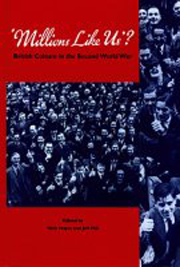Book contents
- Frontmatter
- Contents
- List of Figures and Tables
- Notes on Contributors
- Acknowledgements
- An ‘English War’, Wartime Culture and ‘Millions Like Us’
- British Cinema and ‘The People's War’
- The People's Radio: The BBC and its Audience, 1939–1945
- Was it the Mirror Wot Won it? The Development of the Tabloid Press During the Second World War
- A More Even Playing Field? Sport During and After the War
- A Time for Hard Writers: The Impact of War on Women Writers
- Safe and Sound: New Music in Wartime Britain
- More Than ‘Music-While-You-Eat’? Factory and Hostel Concerts, ‘Good Culture’ and the Workers
- ‘When Work Is Over’: Labour, Leisure and Culture in Wartime Britain
- Not Just a Case of Baths, Canteens and Rehabilitation Centres: The Second World War and the Recreational Provision of the Miners' Welfare Commission in Coalmining Communities
- ‘You and I – All of Us Ordinary People’: Renegotiating ‘Britishness’ in Wartime
- Postscript: A War Imagined
- Index
British Cinema and ‘The People's War’
- Frontmatter
- Contents
- List of Figures and Tables
- Notes on Contributors
- Acknowledgements
- An ‘English War’, Wartime Culture and ‘Millions Like Us’
- British Cinema and ‘The People's War’
- The People's Radio: The BBC and its Audience, 1939–1945
- Was it the Mirror Wot Won it? The Development of the Tabloid Press During the Second World War
- A More Even Playing Field? Sport During and After the War
- A Time for Hard Writers: The Impact of War on Women Writers
- Safe and Sound: New Music in Wartime Britain
- More Than ‘Music-While-You-Eat’? Factory and Hostel Concerts, ‘Good Culture’ and the Workers
- ‘When Work Is Over’: Labour, Leisure and Culture in Wartime Britain
- Not Just a Case of Baths, Canteens and Rehabilitation Centres: The Second World War and the Recreational Provision of the Miners' Welfare Commission in Coalmining Communities
- ‘You and I – All of Us Ordinary People’: Renegotiating ‘Britishness’ in Wartime
- Postscript: A War Imagined
- Index
Summary
The war film discovered the common denominator of the British people.
Roger Manvell.The British cinema of the Second World War has typically been characterized in terms of its representation of ‘the people's war’. The films which have attracted most critical attention are those which presented a picture of the British people at war, united despite class differences, and where the stories of individuals, heroic though they may be, were sublimated into the greater story of the whole nation pulling together at a time of national crisis. Commentators have identified, for the first time in British feature films, an authentic, true-to-life representation of ordinary men and women. Roger Manvell considered that films such as Millions Like Us, San Demetrio, London, Nine Men, The Way Ahead, Waterloo Road and The Way to the Stars ‘showed people in whom we could believe and whose experience was as genuine as our own’. The reason for this newfound realism is usually explained through the influence of the documentary movement, the progressive left-wing sector of the British film industry, on the mainstream feature film producers. During the 1930s documentary had been, at best, a marginal mode of film practice which appealed to the intelligentsia and a small critical elite, but which never won the approval of the majority of the cinema-going audience, who preferred the escapist fantasies offered to them by both American and British feature films.
- Type
- Chapter
- Information
- Millions Like Us?British Culture in the Second World War, pp. 33 - 61Publisher: Liverpool University PressPrint publication year: 1999



